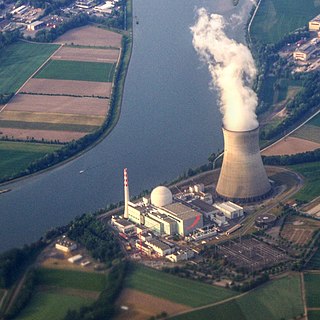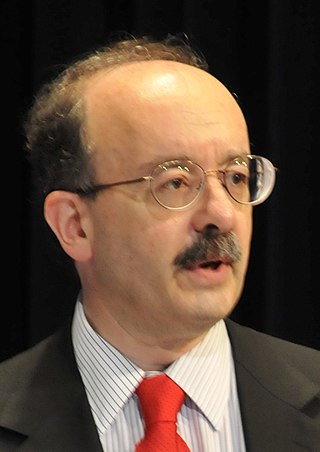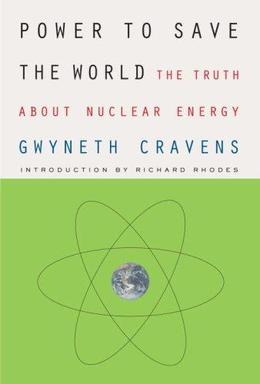Related Research Articles

Nuclear power is the use of nuclear reactions to produce electricity. Nuclear power can be obtained from nuclear fission, nuclear decay and nuclear fusion reactions. Presently, the vast majority of electricity from nuclear power is produced by nuclear fission of uranium and plutonium in nuclear power plants. Nuclear decay processes are used in niche applications such as radioisotope thermoelectric generators in some space probes such as Voyager 2. Reactors producing controlled fusion power have been operated since 1958 but have yet to generate net power and are not expected to be commercially available in the near future.
Nuclear engineering is the engineering discipline concerned with designing and applying systems that utilize the energy released by nuclear processes. The most prominent application of nuclear engineering is the generation of electricity. Worldwide, some 440 nuclear reactors in 32 countries generate 10 percent of the world's energy through nuclear fission. In the future, it is expected that nuclear fusion will add another nuclear means of generating energy. Both reactions make use of the nuclear binding energy released when atomic nucleons are either separated (fission) or brought together (fusion). The energy available is given by the binding energy curve, and the amount generated is much greater than that generated through chemical reactions. Fission of 1 gram of uranium yields as much energy as burning 3 tons of coal or 600 gallons of fuel oil, without adding carbon dioxide to the atmosphere.

The Atomic Age, also known as the Atomic Era, is the period of history following the detonation of the first nuclear weapon, The Gadget at the Trinity test in New Mexico on 16 July 1945 during World War II. Although nuclear chain reactions had been hypothesized in 1933 and the first artificial self-sustaining nuclear chain reaction had taken place in December 1942, the Trinity test and the ensuing bombings of Hiroshima and Nagasaki that ended World War II represented the first large-scale use of nuclear technology and ushered in profound changes in sociopolitical thinking and the course of technological development.

Amory Bloch Lovins is an American writer, physicist, and former chairman/chief scientist of the Rocky Mountain Institute. He has written on energy policy and related areas for four decades, and served on the US National Petroleum Council, an oil industry lobbying group, from 2011 to 2018.

Helen Mary Caldicott is an Australian physician, author, and anti-nuclear advocate. She founded several associations dedicated to opposing the use of nuclear power, depleted uranium munitions, nuclear weapons, nuclear weapons proliferation, and military action in general.

Mark Lynas is a British author and journalist whose work is focused on environmentalism and climate change. He has written for the New Statesman, The Ecologist, Granta and Geographical magazines, and The Guardian and The Observer newspapers in the UK, as well as The New York Times and The Washington Post in the United States; he also worked on and appeared in the film The Age of Stupid. He was born in Fiji, grew up in Peru, Spain and the United Kingdom and holds a degree in history and politics from the University of Edinburgh. He has published several books including Six Degrees: Our Future on a Hotter Planet (2007) and The God Species: Saving the Planet in the Age of Humans (2011).

The Shoreham Nuclear Power Plant was a completed General Electric nuclear boiling water reactor located adjacent to Long Island Sound in East Shoreham, New York.

Harvey Franklin Wasserman is an American journalist, author, democracy activist, and advocate for renewable energy. He has been a strategist and organizer in the anti-nuclear movement in the United States since 1973, and in the election protection movement since 2004. He has been a featured speaker on Today, Nightline, National Public Radio, CNN Lou Dobbs Tonight, Democracy Now!, Thom Hartmann, The Young Turks, Flashpoints, Egberto Willie's Politics Done Right broadcast on KPFT 90.1 fm Houston, Texas, and many other major media and internet outlets. Wasserman has been a senior advisor to Greenpeace USA since 1991, and at the Nuclear Information and Resource Service, an investigative reporter, and senior editor of The Columbus Free Press where his coverage, with Bob Fitrakis, prompted Rev. Jesse Jackson to call Wasserman and Fitrakis "the Woodward and Bernstein of the 2004 election." He lives with his family in Los Angeles where he co-hosts the California Solartopia Show on Pacifica Radio's KPFK 90.7 FM Los Angeles, California. He also co-hosts Green Grassroots Emergency Election Protection Coalition zoom gatherings most Mondays 2 to 4 pm Pacific Time.

The anti-nuclear movement in the United States consists of more than 80 anti-nuclear groups that oppose nuclear power, nuclear weapons, and/or uranium mining. These have included the Abalone Alliance, Clamshell Alliance, Committee for Nuclear Responsibility, Nevada Desert Experience, Nuclear Information and Resource Service, Physicians for Social Responsibility, Plowshares Movement, United Steelworkers of America (USWA) District 31, Women Strike for Peace, Nukewatch, and Women's International League for Peace and Freedom. Some fringe aspects of the anti-nuclear movement have delayed construction or halted commitments to build some new nuclear plants, and have pressured the Nuclear Regulatory Commission to enforce and strengthen the safety regulations for nuclear power plants. Most groups in the movement focus on nuclear weapons.
Henry Nichols Beard is an American humorist, one of the founders of the magazine National Lampoon and the author of several best-selling books.
Canada has an active anti-nuclear movement, which includes major campaigning organisations like Greenpeace and the Sierra Club. Over 300 public interest groups across Canada have endorsed the mandate of the Campaign for Nuclear Phaseout (CNP). Some environmental organisations such as Energy Probe, the Pembina Institute and the Canadian Coalition for Nuclear Responsibility (CCNR) are reported to have developed considerable expertise on nuclear power and energy issues. There is also a long-standing tradition of indigenous opposition to uranium mining.

The nuclear power debate is a long-running controversy about the risks and benefits of using nuclear reactors to generate electricity for civilian purposes. The debate about nuclear power peaked during the 1970s and 1980s, as more and more reactors were built and came online, and "reached an intensity unprecedented in the history of technology controversies" in some countries. In the 2010s, with growing public awareness about climate change and the critical role that carbon dioxide and methane emissions plays in causing the heating of the Earth's atmosphere, there was a resurgence in the intensity of the nuclear power debate.

Robert Stone is a British-American documentary filmmaker. His work has been screened at dozens of film festivals and televised around the world, notably seven of his films have appeared on PBS's American Experience series and four of his films have premiered at the Sundance Film Festival. He is an Oscar nominee for Best Feature Documentary and a three-time Emmy nominee for Exceptional Merit in Documentary Filmmaking.

Pandora's Promise is a 2013 documentary film about the nuclear power debate, directed by Robert Stone. Its central argument is that nuclear power, which still faces historical opposition from environmentalists, is a relatively safe and clean energy source that can help mitigate the serious problem of anthropogenic global warming.
The Breakthrough Institute is an environmental research center located in Berkeley, California. Founded in 2007 by Michael Shellenberger and Ted Nordhaus, The institute is aligned with ecomodernist philosophy. The Institute advocates for an embrace of modernization and technological development in order to address environmental challenges. Proposing urbanization, agricultural intensification, nuclear power, aquaculture, and desalination as processes with a potential to reduce human demands on the environment, allowing more room for non-human species.

Zion Lights is a British author and activist known for her environmental work and science communication.

Power to Save the World: The Truth About Nuclear Energy, by Gwyneth Cravens, is an introduction to the benefits of nuclear power and the science behind it. It is written for members of the lay public who want to learn more about nuclear power, environmentalists concerned about global warming due to fossil fuel combustion; and scientists and others who work in the nuclear world.

Goop is a wellness and lifestyle brand and company founded by the American actress Gwyneth Paltrow. It was launched in September 2008 as a weekly e-mail newsletter providing new age advice, such as "police your thoughts" and "eliminate white foods", and the slogan "Nourish the Inner Aspect". Goop expanded into e-commerce, collaborating with fashion brands, launching pop-up shops, holding a "wellness summit", launching a print magazine, a podcast, and a docuseries for Netflix.
References
- ↑ Brand, Stewart. "Rip Anderson, Gwyneth Cravens: Power to Save the World". Seminars About Long-term Thinking (SALT). Long Now Foundation . Retrieved 18 February 2017.
- ↑ Reiss, Spencer (21 November 2007). "Green With (Nuclear) Energy". Wall Street Journal . Dow Jones . Retrieved 18 February 2017.
- ↑ Cravens, Gwyneth (5 November 2007). "The Truth About Nuclear Energy". Huffington Post. Retrieved October 14, 2014.
- ↑ Cravens, Gwyneth (April 25, 2008). "Is Nuclear Energy Our Best Hope?". Discover. Kalmbach Publishing . Retrieved October 14, 2014.
- ↑ Cravens, Gwyneth (Spring 2002). "Terrorism and Nuclear Energy: Understanding the Risks". Brookings. The Brookings Institution. Retrieved October 14, 2014.
- ↑ "Biography Gwyneth Cravens". Internet Movie Database (IMDB). 2024.
- ↑ Ropeik, David (10 June 2013). "Will Pandora s Promise" Start a New Environmental Movement for Nuclear Power?". Scientific American.
- ↑ Hendra, Tony (2002). "Morning in America". Harper's Magazine.
- ↑ Dubner, Stephen J. (21 November 2007). "Do Not Read This If You Are Anti-Nuclear Energy". Freakonomics®. Retrieved 18 February 2017.
- ↑ Burgos, Danielle (26 January 2018). "Netflix's 'A Futile And Stupid Gesture' Shines A Light On So Many Comedic Geniuses". Bustle. Retrieved 19 October 2019.
- ↑ Lovenheim, Barbara (June 30, 1991). "Keen Observation Pays Off for Author". The New York Times. Retrieved 2007-10-25.
- ↑ Karp, pp. 29–30.
- ↑ "Missing NY Woman Found". 15 May 2022.
- ↑ "🌱 East Hampton Daily: Missing Adult with Alzheimer's Disease". 16 May 2022.